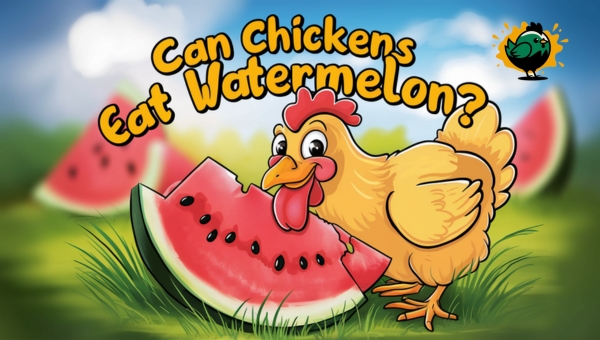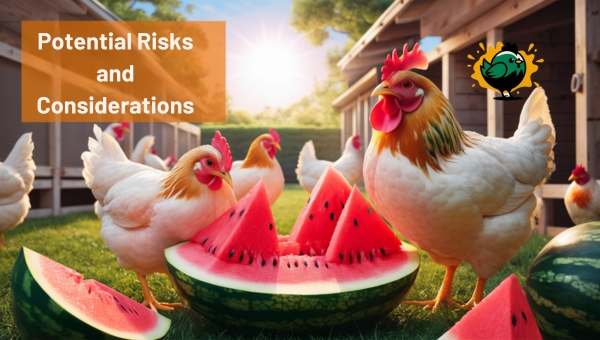Can Chickens Eat Watermelon? A Juicy Guide

It’s a sweltering summer day and your chickens are pecking around the yard, seeking relief from the heat. As you sip on a refreshing slice of watermelon, a thought crosses your mind—can chickens eat watermelon too? This question piques the curiosity of many chicken owners.
In fact, it’s an intriguing topic that opens the door to understanding how this juicy fruit can benefit our feathered friends.
Watermelon is not just a tasty treat for humans; it holds potential nutritional and hydration benefits for chickens as well. Let’s delve into the ins and outs of feeding watermelon to your backyard flock.
Can Chickens Eat Watermelon?
Yes, chickens can eat watermelon, and it is often a delightful treat for them. Watermelon is not only safe but also beneficial for chickens. It serves as a refreshing snack, especially during warmer months. The fruit is packed with nutrients that can contribute positively to a chicken’s diet.

It is important to ensure that the watermelon is fresh and free from any pesticides. When offering watermelon to chickens, it’s best to cut it into manageable pieces, allowing them to peck at the flesh easily.
Both the flesh and seeds are generally safe for chickens to consume. However, moderation is key, as too much watermelon can lead to digestive issues. Always combine treats with a balanced diet to maintain optimal health for your flock.
Nutritional Benefits of Watermelon for Chickens
Watermelon isn’t just a refreshing summer treat for humans; it holds numerous nutritional benefits for chickens too. This juicy fruit is packed with essential vitamins and minerals that can boost your flock’s health.

Moreover, watermelon offers significant hydration benefits, particularly during the warmer months. Let’s take a closer look at how this fruit can be a valuable addition to your chicken’s diet.
Vitamins and Minerals
Watermelon is rich in vitamins and minerals that are beneficial for chickens. Here are some key nutrients found in watermelon:
- Vitamin A: Vital for maintaining good vision and a healthy immune system.
- Vitamin C: Supports the immune system and helps in repairing tissues.
- Vitamin B6: Essential for brain development and function.
- Potassium: Helps in maintaining proper fluid balance and muscle function.
- Magnesium: Important for bone health and energy production.
These nutrients contribute to the overall well-being of chickens, supporting their growth and strengthening their immune systems.
Hydration Benefits
Watermelon is composed of about 92% water, making it an excellent source of hydration for chickens.
Here are the hydration benefits it provides:
- Replenishes lost fluids: Especially helpful during hot weather when chickens are prone to dehydration.
- Maintains body temperature: Ensures chickens stay cool and comfortable.
- Improves digestion: Aids in smooth digestion by providing necessary moisture.
By including watermelon in their diet, you can help keep your chickens hydrated, healthy, and happy.
Also Read: Egg Bound Chicken | Essential Guide to Prevention and Care
How to Safely Feed Watermelon to Chickens?
Feeding watermelon to chickens can be a delightful treat, but it’s important to do so safely. Ensuring the right preparation and serving size is crucial to avoid any health issues. Let’s explore how to properly prepare watermelon for chickens and determine the appropriate portion sizes.
Preparation Tips
To prepare watermelon for chickens, follow these steps to ensure it is safe and enjoyable:
- Wash Thoroughly: Begin by washing the watermelon to remove any dirt or pesticides from the surface.
- Remove Seeds: Cut the watermelon and carefully remove the seeds, as they can be a choking hazard for chickens.
- Cut into Small Pieces: Slice the watermelon into small, manageable pieces that are easy for chickens to peck at and consume.
- Avoid Rind: It is advisable to avoid giving the rind, as chickens may find it difficult to digest.
Serving Size Guidelines
When it comes to feeding watermelon to chickens, moderation is key. Consider these guidelines:
- Limit Treats: Watermelon should make up a small portion of their diet, approximately 10% of their daily intake.
- Observe Portion Sizes: Offer a few small pieces per chicken to ensure they do not overeat.
- Monitor Frequency: Treats like watermelon should be given occasionally, not daily, to maintain a balanced diet.
Potential Risks and Considerations
When including watermelon in a chicken’s diet, it is important to stay informed about potential risks. While this fruit can be a delightful treat, there are a few considerations to be aware of.

Too much watermelon can lead to problems, and monitoring your flock’s health after introducing new foods is essential.
Overfeeding Concerns
Here are some key points to consider:
- Feeding chickens too much watermelon can lead to digestive issues.
- Watermelon is high in sugar, which can cause weight gain if given in excess.
- Overconsumption may result in diarrhea, disrupting their regular diet.
- It’s crucial to balance treats like watermelon with their regular feed to maintain overall health.
Monitor Chicken Health
Observing chickens after feeding them watermelon is vital to ensure they don’t experience negative reactions.
Here are some key points to consider:
- Check for digestive issues: Look for signs such as diarrhea or changes in droppings.
- Watch their behavior: Monitor for lethargy or decreased activity levels.
- Inspect their feathers and skin: Any unusual changes might indicate an adverse reaction.
- Be aware of appetite changes: If they eat less of their regular feed, it might be time to reassess portion sizes or frequency.
By being attentive and cautious, you can ensure that your chickens enjoy watermelon safely.
Also Read: What Can I Feed My Chickens? Essential Guide
Alternative Treats for Chickens
Providing variety in your chickens’ diet is essential for their well-being. Here are some nutritious treats that chickens will enjoy:
- Fruits: Apples, berries, and bananas offer natural sugars and vitamins. Ensure seeds are removed from apples as they can be harmful.
- Vegetables: Carrots, peas, and leafy greens like spinach provide essential nutrients and fiber.
- Grains: Oats and corn are great for energy, offering carbohydrates that chickens need.
- Proteins: Mealworms and scrambled eggs are excellent sources of protein, supporting growth and egg production.
- Herbs: Mint and parsley can be refreshing and also aid in digestion.
Remember to offer these treats in moderation to maintain a balanced diet.
Conclusion
Feeding watermelon to chickens can be a refreshing and nutritious addition to their diet. It’s important to note that this fruit offers essential vitamins and hydration benefits, making it a great treat during hot weather.
However, it’s crucial to maintain moderation to avoid overfeeding and potential health issues. As such, always observe your chickens for any adverse reactions when introducing new foods. By doing so, you ensure their well-being and happiness.
To sum up, when given responsibly, watermelon can be a delightful treat for your feathered friends. If you found this information helpful, be sure to explore more insightful articles on our site!
